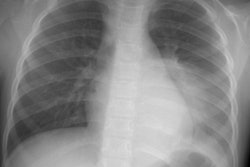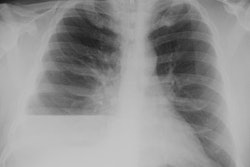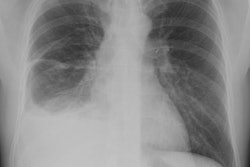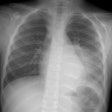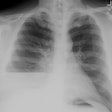AJR Am J Roentgenol 1996 Sep;167(3):649-652. Transcatheter instillation of urokinase into loculated pleural effusion: analysis of treatment effect.
Park CS, Chung WM, Lim MK, Cho CH, Suh CH, Chung WK
OBJECTIVE: Our objective was to evaluate the usefulness of intracavitary instillation of urokinase in the treatment of loculated pleural effusion. SUBJECTS AND METHODS: We analyzed CT and sonographic scans of 31 patients with loculated pleural effusion treated with intracavitary urokinase. When the drainage was less than 100 ml/day, urokinase was instilled through the catheter until the drainage was less than 50 ml/day. Response to the treatment was assessed on follow-up chest radiographs and classified into three groups: completely effective (lung expansion > 80%), partially effective (20-80%), and ineffective (< 20%). The sonographic pattern of pleural fluid was classified as anechoic, linear septated, or honeycomb, and the thickness of the parietal pleura was measured on CT scans. RESULTS: Of the 16 patients in whom treatment was completely effective, sonography showed an anechoic appearance in 12 and a linear septated appearance in four, and the thickness of the parietal pleura on CT scans was 2 mm in six, 3 mm in seven, and 4 mm in three. Of the nine patients in whom treatment was partially effective, sonography showed an anechoic appearance in six and a linear septated appearance in three, and the thickness of the parietal pleura on CT scans was 3 mm in five and 4 mm in four. Of the six patients in whom treatment was ineffective, sonography showed a linear septated appearance in one and a honeycomb appearance in five, and the thickness of the parietal pleura on CT scans was 3 mm in one, 4 mm in two, 5 mm in one, and 6 mm in two. CONCLUSION: Urokinase instillation through a percutaneous catheter was effective in the treatment of loculated pleural effusion in most patients but was not effective in patients whose pleural fluid had a honeycomb appearance on sonography or whose parietal pleura had a thickness of more than 5 mm on CT scans.
PMID: 8751672, MUID: 96350026
